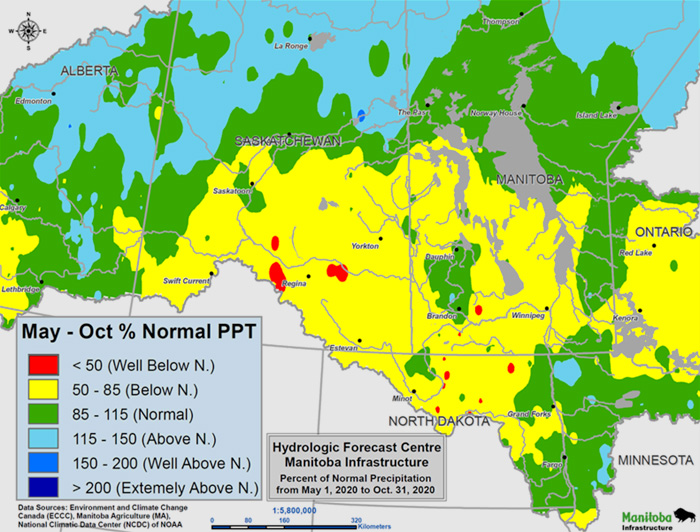Manitoba Infrastructure’s Hydrologic Forecast Centre has released the 2020 Fall Conditions Report that indicates soil moisture levels before freeze-up are normal to below normal in most Manitoba basins.
“The 2020 Fall Conditions Report describes the hydrologic conditions of Manitoba basins at the time of freeze-up,” said Infrastructure Infrastructure Minister Ron Schuler. “Hydrologic and weather conditions in the winter and spring are the main factors that affect the risk and extent of high water events.”
Soil moisture at freeze-up is one of the major factors that affects spring run-off and potential flood risks. Due to minimal summer and fall precipitation, the soil moisture at freeze-up is normal to below normal for most of southern, central and western Manitoba basins, with the exception of the Little Saskatchewan River basin and in areas close to Brandon where the soil moisture is normal to above normal. Northern Manitoba basins, including the Saskatchewan and Churchill river basins, have normal to above normal soil moisture.
The minister noted another factor affecting potential spring high water events is the base flow in rivers and the water levels on lakes prior to freeze-up. Base flow is a portion of the stream flow that is not from surface run-off; it is water from the ground, flowing into the river channel over a period of time. Base flows on most rivers are normal to below normal for this time of the year, with the exception of northern Manitoba rivers, where base flows are well above normal to record high.
Environment and Climate Change Canada’s December long-term precipitation forecast indicates precipitation will be normal to above normal from December to February for most of Manitoba and Saskatchewan. The National Weather Service (NWS) Climate Prediction Center’s outlook indicates above normal precipitation within the U.S. portion of the Red and Souris river basins from December to March.
“We will continue to monitor watershed conditions closely and will release spring flood outlooks through the winter as required,” noted Schuler.


